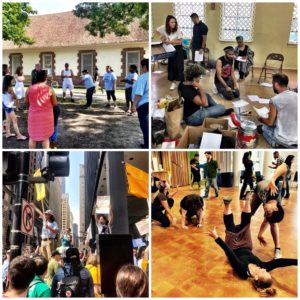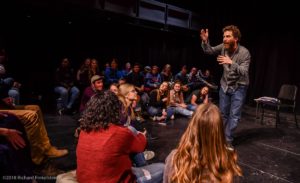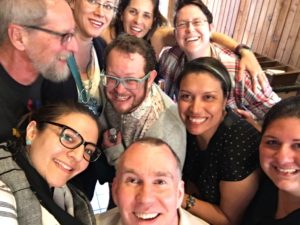So You Want to Host a PTO Conference?
 Thank you for your interest in the annual gathering held by Pedagogy and Theatre of the Oppressed, Inc! Conferences, festivals, and gatherings can be daunting, and we’re here to help you stay charged up about your interest in hosting PTO in your community while also providing some realistic descriptions of what our meeting needs are!
Thank you for your interest in the annual gathering held by Pedagogy and Theatre of the Oppressed, Inc! Conferences, festivals, and gatherings can be daunting, and we’re here to help you stay charged up about your interest in hosting PTO in your community while also providing some realistic descriptions of what our meeting needs are!
The purpose of this page is to help provide just a tiny amount of important information to help you decide if you might host a conference! While the information here is not exhaustive, it will help you begin to think about what it might mean to host a PTO conference/gathering/festival!
If you have already decided, please fill out this document to officially declare your desire to host the annual PTO Conference.
Benefits of Hosting a Conference
- build and develop local networks of educators, artists, community organizers, and activists;
- help shape the conference YOU wish to see (local organizing committees help set up all-conference events/performances, invite guests, help select session presentations, determine the conference theme, etc.);
- bring learning, training, and artistic opportunities to your community;
- develop pre- and post-conference learning/workshop opportunities;
- help local people attend the conference through volunteer, scholarship, and work-trade opportunities.
Basic Conference Needs

If you’re still excited about hosting a conference, you might think a bit about some of the needs we have for each annual gathering. Here is a short list of the most important needs that we have for each conference:
- space for 300-400 people to be able to gather at one time (all-conference sessions, social gatherings, lunches, etc.);
- space that can be used for 3-4 days for the gathering (usually Thursday night through Sunday afternoon) and space that can be used for pre-conference and post-conference workshops (usually up to three days);
- flexible spaces for up to 10 or so simultaneous breakout sessions ranging from embodied workshops to smaller performances to paper presentations;
- space that is accessible for persons with varying physical needs;
- restrooms that are or can be gender-neutral.
We rely on free/donated/reduced-cost space to help keep our conference fees low/accessible. We frequently gather in university/college locations. However, we’ve also been in community centers, activist spaces, high schools, etc. Our hope is that our conference locations can be as accessible as possible!
Housing
We try to have at least two types of housing available to out-of-town attendees: hotel rooms and significantly cheaper housing such as dorm rooms or something similar. Housing should be close enough to the conference site(s) that participants can walk, or else there should be options for shuttling. Shuttling is also essential for participants who may not be able to walk easily. Any hotel housing blocks should be in hotels that are on union-approved lists.
Food
We typically provide lunch on full conference days as well as snacks and coffee throughout the conference. When possible, we try to work with local organizations to provide inclusive food for attendees with a variety of food needs, requirements, and allergies. University/College sites frequently require use of university/college food services, which is something to bear in mind. We also try to partner with local food kitchens or other organizations who might be able to take donate food so there is little to no food waste.
Paying for the Gathering
The PTO Board will allocate funding to pay for the conference (so you don’t have to pay for the conference yourself!) with the idea that the conference will pay for itself through registration fees, grants, in-kind donations, etc. The Board will work with you to help find grants (especially local grants) and write grant proposals to help keep registration fees as low as possible. Our goal is for each conference to pay for itself so that we can keep having annual gatherings.
Working with the PTO Board

The board of PTO is an all-volunteer working board. This means that in hosting a conference you don’t have to do everything all by yourself or only with your local planning committee!
The Board will help you plan a flexible budget, help you hone a theme for the conference (which you determine based on your community’s own needs and struggles), help you build the conference, invite guests, plan all-conference events, etc.
You have a lot of freedom to shape the conference to your community. The board will help you and will also help you meet needs of international situations, international participants, etc.
The relationship with the board is highly collaborative and relationship-focused. At least one board member will serve as the main liaison between the board and the local planning committee, although all board members are available to help!
Timeline
It usually takes at least a year to plan a conference (although we’ve done it in less time in emergency situations). We try to be 2-3 years out in planning, but one year is the minimum. During that lead time, you can plan to meet at least monthly with your local committee, and as the conference gets closer, you will probably find yourself meeting more frequently, every other week and then weekly!
Also, in general we hold the PTO conference in early summer (late May or early June), although according to the needs of the local site, we have gone as late as July!
Application Process
All local organizing groups who are interested in hosting the PTO conference are invited to submit a conference site application. This short, preliminary application is the first step in a longer dialogue between your local group and the PTO Board. That dialogue aims to determine if a conference in your area would benefit both your local community and PTO. If the PTO Board feels confident that your city/town is a potential host site, you will be contacted about scheduling in-depth telephone or video conversations with a sub-committee of PTO board members to discuss the conference process. The subcommittee will report back to the board about conversations with potential hosts. Based on those reports the board will select its conference site.
If you would like more detailed information, please consult our PTO Conference Process Guide (Evergreen 2020), which describes in detail the standard features of the conference, the division of labor, and responsibilities between the PTO board and the local hosts as well as providing a detailed timeline for when significant actions should be completed.

You must be logged in to post a comment.